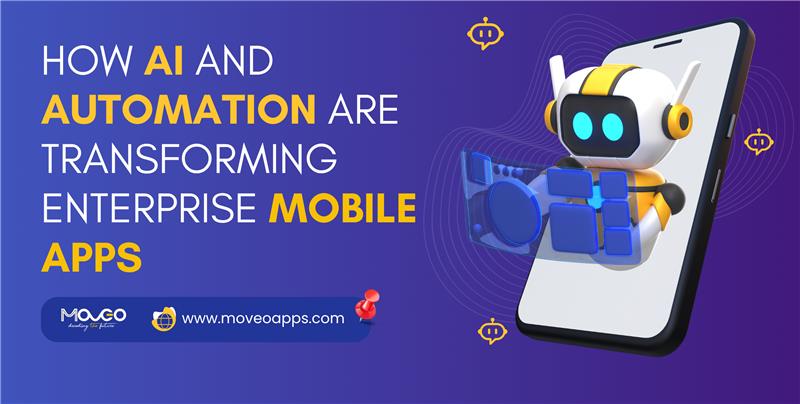AI in enterprise mobile apps is no longer just a futuristic promise. It’s happening now, and it’s delivering results. According to IBM, Enterprise AI is already being used to streamline business functions, improve decision-making, and create more personalized customer experiences. From predictive insights to fully automated workflows, AI is turning enterprise apps into intelligent digital teammates.
With enterprises under increasing pressure to streamline operations and deliver seamless digital experiences, traditional mobile apps are no longer enough. Today’s leading organizations are turning to AI and automation not just to enhance their operations, but to transform how business gets done.
In this article, we’ll explore the role of AI and automation in enterprise mobile apps, unpack real-world use cases, highlight measurable benefits, and look ahead at emerging trends.
What Is Enterprise AI?
Before we dive into mobile implementations, let’s define what enterprise AI actually means. Enterprise AI refers to the integration of artificial intelligence technologies, such as machine learning, natural language processing, and computer vision, into business systems to improve performance, and drive data-informed decisions, across all categories of apps ranging from finance and payments to health and fitness.
Real-world enterprise AI applications span industries:
- In finance, AI is used to detect fraud, predict risk, and automate reporting.
- In manufacturing, it supports predictive maintenance and supply chain optimization.
- In HR, it powers talent acquisition, attrition prediction, and personalized employee engagement tools.
According to SAP, enterprise AI helps make business processes less manual, more accurate, and highly scalable.
What Is the Role of AI in Enterprise Mobile Apps?
AI is redefining how enterprise apps function, going from passive tools to proactive, decision-making systems. As mobile devices become more embedded in business workflows, integrating AI enables smarter, faster, and more personalized user experiences.
AI in enterprise mobile apps goes far beyond chatbots and voice commands. It’s about embedding intelligence into the core functions of the application, empowering apps to learn from data, adapt to user behavior, and make real-time decisions.
Common AI features in enterprise apps include:
- Predictive Analytics: Predictive analytics uses machine learning to identify trends and anticipate future outcomes, such as sales forecasts, equipment maintenance needs, or customer churn, empowering more proactive, data-driven decisions.
- Natural Language Processing (NLP): In enterprise mobile apps, NLP helps users interact with systems using natural speech or typed queries, enabling faster data retrieval, intuitive navigation, and hands-free productivity.
- Personalization Engines: These systems tailor the user experience by analyzing behavioral patterns, preferences, and contextual data. Whether it’s surfacing relevant dashboards, curating reports, or sending time-sensitive alerts, personalization engines improve engagement by making each user’s app experience feel uniquely relevant.
- Computer Vision: By enabling devices to interpret visual data, computer vision allows enterprise apps to scan barcodes, recognize handwritten notes, validate identity documents, or assess product quality, all in real time. This is transforming industries like logistics, insurance, healthcare, and manufacturing where visual input is key to operations.
According to recent industry reports, over 60% of enterprise mobile apps are expected to feature AI-driven functionality by the end of 2025.
How Is Automation Improving Enterprise App Efficiency?
Automation complements AI by streamlining tasks that once required manual input. It reduces time, error, and effort across departments, creating faster, more consistent user and admin experiences.
Automation in enterprise apps focuses on eliminating repetitive, manual tasks by integrating rule-based logic and trigger-based workflows. This boosts speed, accuracy, and productivity across departments.
Key areas where automation is delivering impact:
- Workflow Automation: Automatically routing approvals, alerts, and escalations
- Data Synchronization: Keeping information updated across systems (ERP, CRM, HRMS)
- Task Automation: Auto-filling forms, logging service calls, and updating inventory
- Trigger-Based Actions: Setting rules like “if invoice is overdue, send a reminder and flag to finance”
By 2026, nearly 88% of enterprises are expected to increase investment in workflow automation for mobile-based operations.
What Are the Main Benefits of AI and Automation in Mobile Apps?
The move toward intelligent apps is about innovation and impact. AI and automation are proving to be game-changers for business efficiency, user satisfaction, and bottom-line results.
The integration of AI and automation in enterprise mobile apps offers tangible business advantages:
- Increased Productivity: Less time spent on manual data entry or searching through systems
- Smarter Decision-Making: Real-time insights and analytics for faster, more accurate choices
- Reduced Errors: Automated data flows mean fewer human mistakes
- Enhanced User Experience: Personalized interfaces and streamlined workflows
- Cost Savings: Lower operational costs through optimized resource utilization
In fact, AI-powered mobile apps have been shown to reduce operational costs by up to 35% and improve user retention by 25%. As SAP notes, enterprise AI helps make processes less manual, more accurate, and faster.
What Are the Challenges of Using AI in Enterprise Mobile Apps?
While the potential is enormous, implementation isn’t without hurdles. From integration and security to change management, enterprises must navigate these challenges strategically.
Despite the promise, integrating AI and automation into mobile apps isn’t without its challenges:
- Data Privacy & Compliance: Ensuring enterprise data is handled securely and ethically
- Integration Complexity: Connecting AI services with legacy systems can require significant backend engineering
- Change Management: Employees must adapt to new ways of working, requiring training and support
- Cost of Implementation: AI development requires strategic investment in both talent and infrastructure
According to TechTarget, enterprise AI initiatives often struggle with data availability and integration challenges. Successful AI implementation requires not just the right tools, but a clear roadmap, internal buy-in, and cross-functional alignment.
What Are Real-World Use Cases of AI and Automation in Enterprise Apps?
Across industries, forward-thinking companies are already using AI and automation to drive meaningful outcomes. These use cases offer a glimpse into what’s working right now.
Here are some industry-specific examples:
- Field Services: AI guides technicians through diagnostics, automates service reports, and uses GPS + ML to optimize routing
- Sales Enablement: Reps receive predictive lead scoring, AI-suggested pitches, and automated post-call summaries
- HR & Employee Apps: Onboarding workflows, leave approvals, and feedback loops are fully automated and personalized
- Logistics: Real-time tracking, route optimization, and proactive exception handling
These applications are no longer experimental. They’re driving measurable ROI today.
What Is the Future of AI in Enterprise App Development?
The next chapter of enterprise mobility is being written by AI. Emerging technologies are opening new doors to hyper-personalized, autonomous, and context-aware mobile solutions.
The next wave of innovation includes:
- Hyperautomation: Combining AI, RPA, and low-code tools to automate complex, multi-step workflows
- Generative AI Integration: Using tools like GPT to write reports, summarize meetings, or automate ticket responses
- Personalized AI Agents: Enterprise Copilot-style assistants built into mobile apps
- Edge AI on Mobile: Processing AI tasks directly on devices, reducing latency and preserving privacy
As these technologies mature, enterprise mobile apps will evolve from task-based tools into intelligent collaborators.
Final Thoughts
AI and automation are not just technological upgrades—they are strategic imperatives for the future of enterprise mobility. We’re witnessing a fundamental shift where apps no longer just support operations—they help drive them. Businesses that embed AI at the core of their mobile strategy aren’t just improving efficiency; they’re future-proofing themselves against disruption.
What once took entire teams to execute can now happen in real time, triggered by user behavior, data patterns, or environmental signals. The enterprise app is evolving—from a static tool to a dynamic system that senses, learns, and responds. This isn’t hype—it’s already underway in leading organizations worldwide.
The question isn’t whether AI and automation will become standard in enterprise mobile apps. The real question is: Will you lead the transformation, or lag behind?
You want to lead of course. So get in touch with us today, and let’s build an enterprise mobile app that drives your business forward.


